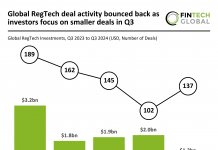A BAE Systems survey has found nearly three-quarters of financial organisations have experienced a rise in cybercrime since the beginning of the Covid-19 pandemic.
The survey included 902 banks and insurers across the UK and the US and also identified the uptick in crime is causing a significant monetary impact. This was found through half of the survey respondents detailing they saw a rise in financial losses over the past year – with the average cost reaching $720,000 and climbing.
When identifying the causes of the climb in cybercrime, 42% of respondents said they believed remote work has made them feel less secure. Meanwhile, just under half of those surveyed said they were concerned the home working has led to less visibility of possible holes in their infrastructure or network, while 37% believe their customers are at a greater risk now of fraud or cybercrime.
BAE also surveyed over 2000 consumers on the topic of cybercrime. They found over a quarter say they had been sent an email hoax relating to COVID-19, while 22% had been targeted via text or SMS. The average amount of money stolen by cybercriminals accounted for $1,174.
The growth of online shopping during the pandemic also led to an increased amount of cybercrime, with the survey detailing more than 25% of respondents have bought something from a fraudulent site over the past year and not received the goods.
Over half of respondents said they believed it was the job of the banks to protect them, while 40% claimed they believed it was their own responsibility. In addition, over 50% said banks or credit card providers could offer more guidance to consumers on how to be better protected from cybercrime.
These issues have been compounded by a BAE finding that IT security, cybercrime and risk department budgets have been slashed by a quarter over the past year, with 40% having to cut back on critical security technology spend. More than a third have had to reduce the headcount in the IT security teams over the past year.
BAE Systems Applied Intelligence head Adrian Nish said, “We’re noticing a clear collaboration emerging between different groups of criminals across the wider landscape of serious and organised crime. Fraudsters and cybercriminals seek to exploit fear, uncertainty and change, and the pandemic has offered them new opportunities to probe for weaknesses they can monetise and new ways to disguise their activity.
“Attackers are building increasingly advanced capabilities to target core banking systems and becoming more aggressive, harming victims’ ability to respond to attacks. Online criminals have reacted fast, adapting their approach to hunt out remote working security gaps and prey on the vulnerable.”
Copyright © 2021 FinTech Global











